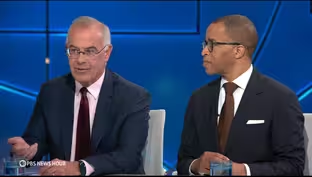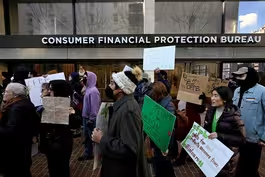
Free access to dozens of preventive care treatments at risk
Clip: 4/18/2025 | 7m 56sVideo has Closed Captions
Free access to dozens of preventive care treatments at risk in Supreme Court case
The Supreme Court will hear arguments on Monday challenging the constitutionality of a provision in the Affordable Care Act that requires most private health insurance plans to cover preventive care at no cost to the patient. As Laura Barrón-López reports, the case could have a profound impact on the health care millions of Americans use to stay healthy and prevent disease.
Problems playing video? | Closed Captioning Feedback
Problems playing video? | Closed Captioning Feedback
Major corporate funding for the PBS News Hour is provided by BDO, BNSF, Consumer Cellular, American Cruise Lines, and Raymond James. Funding for the PBS NewsHour Weekend is provided by...

Free access to dozens of preventive care treatments at risk
Clip: 4/18/2025 | 7m 56sVideo has Closed Captions
The Supreme Court will hear arguments on Monday challenging the constitutionality of a provision in the Affordable Care Act that requires most private health insurance plans to cover preventive care at no cost to the patient. As Laura Barrón-López reports, the case could have a profound impact on the health care millions of Americans use to stay healthy and prevent disease.
Problems playing video? | Closed Captioning Feedback
How to Watch PBS News Hour
PBS News Hour is available to stream on pbs.org and the free PBS App, available on iPhone, Apple TV, Android TV, Android smartphones, Amazon Fire TV, Amazon Fire Tablet, Roku, Samsung Smart TV, and Vizio.
Providing Support for PBS.org
Learn Moreabout PBS online sponsorshipWILLIAM BRANGHAM: The U.S. Supreme Court will hear arguments on Monday, challenging the constitutionality of a provision in the Affordable Care Act that requires most private health insurance plans to cover preventive care at no cost to the patient.
As Laura Barron-Lopez reports, the case could have a profound impact on the health care millions of Americans use to stay healthy and prevent disease.
LAURA BARRON-LOPEZ: Attorney and queer activist Preston Mitchum has been taking pre-exposure prophylaxis, or PrEP, to prevent HIV every day for about a decade.
PRESTON MITCHUM, Washington, D.C., Resident: Just being able to wake up and have a piece of mind has to be the number one benefit for me about why I still take it.
LAURA BARRON-LOPEZ: PrEP reduces the risk of getting HIV from sex by about 99 percent and from injection drug use by at least 74 percent.
PRESTON MITCHUM: For me, there's always going to be a benefit to understanding what you need for your body to be healthy.
I know it's really important for me to protect my body and not only my body, my partner's bodies along the way.
LAURA BARRON-LOPEZ: The medication was first approved in 2012 and is now available in two forms.
MAN: One, two.
LAURA BARRON-LOPEZ: A shot every other month or a daily pill.
DR. KYLE BENDA, Whitman-Walker Health: PrEP and preventive care is kind of the cornerstone of what we do here at Whitman-Walker.
LAURA BARRON-LOPEZ: Dr. Kyle Benda is a director of medical operations at Whitman-Walker Health, a nonprofit in Washington, D.C., that offers primary care and specializes in HIV treatment.
He credits PrEP with helping to reduce new cases of HIV in the nation's capital by 12 percent from 2012 to 2021.
DR. KYLE BENDA: While our HIV treatments are amazing and life with HIV is very different than I think what a lot of folks may think of, for the health of our population, prevention of HIV is paramount.
LAURA BARRON-LOPEZ: Still, the cost of the drug is so high that, without financial help, for most people like Preston Mitchum, PrEP would be out of reach.
PRESTON MITCHUM: When I first got the actual prescription and they rang it up, it shot up.
It was like $2,000, $2,100.
I was like, there's no way I can afford this.
No way.
LAURA BARRON-LOPEZ: But since 2021, because of a provision in the Affordable Care Act, Mitchum's insurer and almost all health plans have been required to fully cover the cost of PrEP, which can total up to $30,000 a year.
Soon, that could change.
The Supreme Court will hear arguments Monday in a case that could eliminate not just free access to PrEP, but cost-free access to at least two dozen other preventative health care treatments.
DR. MARK FENDRICK, University of Michigan School of Medicine: Millions and millions of people would be impacted.
These incredibly popular, but potentially under-the-radar services, like mental health screenings, cancer screenings, cardiovascular, G.I.
conditions, will all be impacted if the Supreme Court rules that health plans no longer have to cover these services 100 percent without out-of-pocket expenditures.
LAURA BARRON-LOPEZ: Medical professor Dr. Mark Fendrick helped draft the preventative care provision in the Affordable Care Act now at the center of this case.
DR. MARK FENDRICK: We noticed that, when Americans had to pay more for everything, we saw that lots and lots of people were deferring essential preventive services because they had to pay large amounts of out-of-pocket costs.
LAURA BARRON-LOPEZ: The original suit was brought by two Christian-owned businesses and six people in Texas who argued that covering PrEP in their health plans conflicts with their religious beliefs, claiming the drugs - - quote -- "facilitate and encourage homosexual behavior, prostitution, sexual promiscuity, and intravenous drug use."
NICHOLAS BAGLEY, University of Michigan Law School: This lawsuit is part of a much broader pattern of challenging the Affordable Care Act that stretches back to the moment that it was signed.
LAURA BARRON-LOPEZ: Nicholas Bagley is a law professor at the University of Michigan who has followed the case.
He says, in 2022, the plaintiffs were granted religious exemptions and no longer have to provide PrEP under their insurance plans.
What the Supreme Court will now consider goes beyond religious freedom arguments and could have a much larger impact.
The businesses and conservative Christians who filed the lawsuit also want to get rid of the preventative care requirement altogether.
NICHOLAS BAGLEY: They believe very deeply in religious freedom and are aligned with conservative causes and so are using this as an effort to push back on what they see as the excesses of the Affordable Care Act.
LAURA BARRON-LOPEZ: But Dr. Fendrick warns that would have devastating consequences on American health care.
Under the ACA, a task force made up of 16 medical experts decides which preventative care services must be fully covered by most private insurance plans.
DR. MARK FENDRICK: One of the strengths of using the U.S. Preventive Services Task Force is in fact they are an independent body.
They are very, very deeply vetted and they have expertise in clinical medicine, preventive screenings, population health.
These are the folks that I at least would like to be seeing making the decisions based on science and available evidence to determine what are those preventive services that should be covered at no cost to patients.
LAURA BARRON-LOPEZ: But Thomas Berry of the Libertarian Cato Institute believes that the task force is unconstitutional because its members are selected by the secretary of health and human services, instead of nominated by the president and confirmed by the Senate.
THOMAS BERRY, Cato Institute: In a democracy, where we elect a president, where we have a presidential election that pits two competing ideologies against each other, ultimately, the people have to have some say in the final decisions.
LAURA BARRON-LOPEZ: He wrote an amicus brief supporting the Texas businesses and individuals who brought the suit.
Berry argues the task force makes rules without public accountability and that all of the health care coverage it's mandated since passage of the Affordable Care Act in 2010 should be rolled back.
THOMAS BERRY: Ultimately, the president has to have a clear line of authority to every other decision-maker within the executive branch.
If you have that bright line rule, the public can blame the one person that they had an opportunity to vote for, which is the president.
LAURA BARRON-LOPEZ: If the Supreme Court disagrees with that argument and decides the HHS secretary can continue to control task force membership, Nicholas Bagley says that will likely mean that Secretary Robert F. Kennedy Jr. will have more control over what exactly is covered by private insurance.
NICHOLAS BAGLEY: If the secretary wins this case, it's going to be because the court holds that he's got a great deal of control over this body.
And especially given his idiosyncratic, at best, beliefs about medicine and about the best kind of medical care, we have reason to wonder how he's going to exercise that authority and whether he's going to appoint people who are very far outside the medical mainstream.
DR. KYLE BENDA: Two procedures, PrEP patient.
LAURA BARRON-LOPEZ: Back in Washington, D.C., Dr. Benda is already bracing for the possibility that his patients may soon be paying for preventative care out of pocket, if they can afford it.
Ultimately, what do you think is the biggest risk if PrEP or other preventative care is no longer fully covered?
DR. KYLE BENDA: I think our greatest risk is of increased HIV and increased risk of chronic disease and a decrease in patient life expectancy, an increase in our costs associated with taking care of folks with chronic disease.
Our patients won't be able to live longer, healthier lives.
LAURA BARRON-LOPEZ: The justices will decide this latest challenge to the Affordable Care Act and the future of health care access for patients across the country by this summer.
For the "PBS News Hour," I'm Laura Barron-Lopez in Washington, D.C.
Attorney for deported man on the refusals to return him
Video has Closed Captions
Clip: 4/18/2025 | 7m 24s | 'Let's have a real court case': Attorney for deported man on the refusals to return him (7m 24s)
A Brief But Spectacular take on family
Video has Closed Captions
Clip: 4/18/2025 | 4m 49s | A Brief But Spectacular take on family (4m 49s)
Brooks and Capehart on Trump's faceoff with the courts
Video has Closed Captions
Clip: 4/18/2025 | 11m 1s | Brooks and Capehart on Trump's faceoff with the courts (11m 1s)
The potential impacts of mining the ocean floor
Video has Closed Captions
Clip: 4/18/2025 | 6m 19s | The potential impacts of mining rare minerals from the ocean floor (6m 19s)
Trump order makes it easier to fire federal workers
Video has Closed Captions
Clip: 4/18/2025 | 3m 23s | Trump moves to reclassify federal workers, making it easier to fire them (3m 23s)
What happened when Calgary removed fluoride from its water
Video has Closed Captions
Clip: 4/18/2025 | 5m 59s | What happened when Calgary removed fluoride from its water supply (5m 59s)
Providing Support for PBS.org
Learn Moreabout PBS online sponsorship
- News and Public Affairs

FRONTLINE is investigative journalism that questions, explains and changes our world.

- News and Public Affairs

Amanpour and Company features conversations with leaders and decision makers.












Support for PBS provided by:
Major corporate funding for the PBS News Hour is provided by BDO, BNSF, Consumer Cellular, American Cruise Lines, and Raymond James. Funding for the PBS NewsHour Weekend is provided by...





